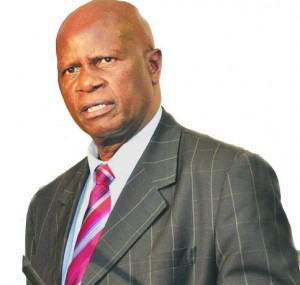Here is the point:
- Budget Expenditures USD 4.1 billion = 28.2% of GDP
- Of which employment costs will take USD 3billion
- This will leave only USD400 million for all ministries’ operations plus
- USD180 million for servicing debts.
- Because Budget Revenues are USD 3.7 billion a provision of USD520 million for the Capital budget will mean a budget deficit of USD400 million on top of the 2016 budget deficit of USD1.18 billion.
So where is the budget going? And where is the money? The answer is that all the money is literally consumed by employments costs. Remember that the wage bill is inflated by ghost employees who are mainly Zanu PF activists paid to do nothing. The MDC has repeatedly called upon Government to flush out all ghost workers but Zanu PF has refused to touch its support base.
The other major reason for the absence of fiscal space is the question of the public debt and debt arrears.
As at 31 October 2016, public debt stood at USD11.2 billion which is 79% of GDP. Out of that, USD7.5 or 53% is external debt. Of the 7.5 billion debt USD5.2billion are arrears. So far Government has prioritized the repayment of debts to multi-lateral organizations as follows:
- IMFÂ 107 million (cleared)
- World Bank 1.16 billion (outstanding)
- European Investment Bank 212 million (outstanding)
- African Development Bank 610 million
Now with no Foreign Direct Investment; No official development assistance (ODA); No fresh loans from multi-lateral institutions, the only source of revenue for government is Growth. If you read the budget statement you see that in 2017 the economy will only grow by a marginal increase from 0.6% in 2016 to 1.7% in 2017. Such a small growth rate cannot generate enough revenues to meet the 4.1 billion budget.
If you examine all these metrics, you wont need rocket science to understand that Chinamasa’s budget is a static budget.
Now what will happen to critical sectors like health, social services and education. Obviously there will be a humanitarian catastrophe.
Who says there is no alternative?
It is possible to stimulate the economy provided there is business and investor confidence. It is easy to stimulate the economy provided government cuts recurrent expenditures and eliminate the budget deficit; It is easy to stimulate the economy if the investment climate and ease of doing business is addressed, including the deletion of the indigenization law and policy. Yes it is possible to increase productivity with the right policies.
Unfortunately, all these possibility frontiers are blocked by a governance crisis which erupted after the rigged 2013 elections.
I rest my case.
Tapiwa Mashakada, MDC Secretary for Finance and Economic Affairs
Post published in: Economy



